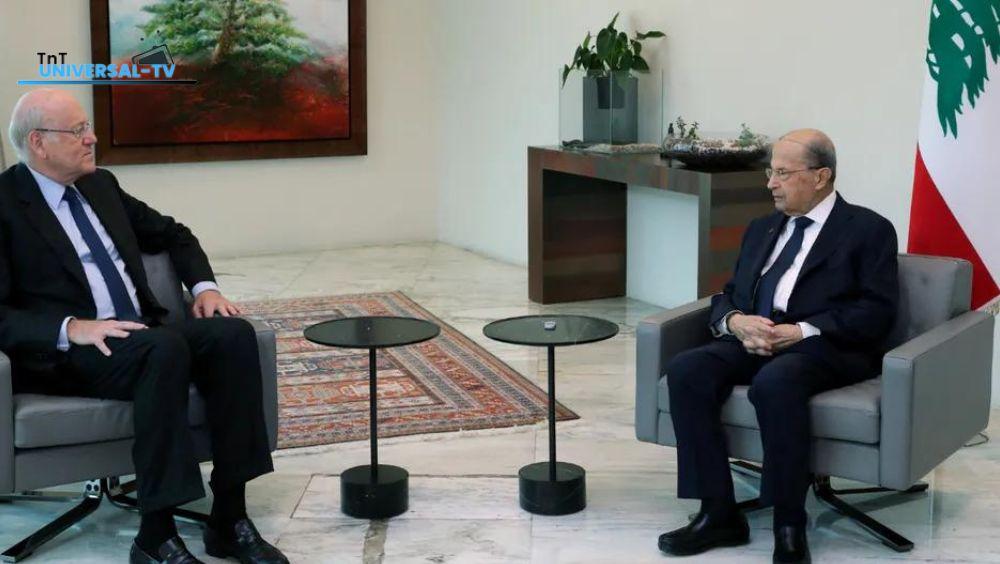
The Lebanese began the first day of the presidential vacancy phase, amid the frequencies of the crisis inherent in the interpretation of constitutional duties and powers, traditionally applied, between the outgoing president, Michel Aoun, and the caretaker prime minister, Najib Mikati.
The features of this crisis between the two men appeared, on Sunday, when Aoun signed a presidential decree accepting the resignation of the current caretaker government, which prompted Mikati to announce his rejection of the decree, claiming that signing it contradicts the articles contained in the Lebanese constitution.
Is it decided by Parliament?
Parliament Speaker Nabih Berri called for a session to be held under the dome of Parliament, next Thursday, to read the president’s message, in which he considered that his step comes after Prime Minister-designate Najib Mikati expressed “his lack of enthusiasm for authorship for various reasons,” and to cut off the way for him to “hold parliament sessions.” Ministers” in violation of the “concept of conducting business in the narrow sense”.
The message of outgoing President Michel Aoun included the following:
“The refusal of the designated Head of Government to form a government pursuant to the provisions of Articles 53 (paragraph 4) and 64 (clause 2) of the Constitution, and the affirmation of the state of conduct of business in the narrow sense of the government which he currently heads, and which was deemed to have resigned pursuant to Article 69 (paragraph 1, clause e).
While Lebanon is on the verge of vacating the presidency at the end of the presidential term, which vacates the first position in the state and empties the procedural authority from the one in charge of it, i.e. the Council of Ministers in accordance with Articles 17 and 65 of the Constitution.
On the other hand, Berri received from Mikati a counter letter in which he considered that “the decree that accepted the resignation of the government, which had originally resigned in accordance with the provisions of the constitution, lacks any constitutional value,” saying:
“On 10-30-2022 Decree No. 10942 was issued accepting the resignation of the originally ‘resigned’ government, pursuant to the text of Article /69/ of the Constitution due to the beginning of the mandate of the House of Representatives, without being accompanied by the issuance of a decree assigning the President, who was signed by the selection of the ladies and gentlemen deputies to form the government based on the Parliamentary consultations are binding in accordance with Article 53 of the Constitution.
“This decree undoubtedly wears an advertising rather than a constructional character, with the most important consequences of that being that the conduct of business becomes one of the duties of the resigned government, or that is considered by virtue of the resignation without the need for a decision issued by the President of the Republic in this regard.”
Presidential powers
Aoun’s step is considered a precedent in Lebanon, where the President of the Republic must issue a decree accepting the resignation of the government, on the same day he signs the decrees appointing the prime minister and forming a new government, so that the three decrees are issued together.
The reason for this is that the amendments made to the Lebanese constitution, under the “Taif Agreement” that ended the civil war (1975-1990), led to stripping the President of the Republic of some of his powers and placing them at the disposal of the Council of Ministers, which made him lose the advantage of “appointing” ministers and The “choice” of the prime minister from among them, in contrast to the current situation, especially since the “pain” of forming the first government during the era of President Aoun (2016-2022), headed by Saad Hariri, took about 9 months, although Lebanon He was in dire need (at the time) of an executive authority to deal with the repercussions resulting from the spread of terrorist groups and cells over his lands.
As for the last government that recently turned into a caretaker government headed by Mikati, the situation seems different, especially in terms of the lack of communication chemistry between Baabda and the Serail, according to the views of many observers of the Lebanese issue, although the repercussions caused The stifling economic crisis has become much more dangerous for the Lebanese than the repercussions of terrorism and its derivatives.
At the moment, attention is focused, with great interest, on the results of the session scheduled for next Thursday in the House of Representatives, to determine the extent of the dangers facing Lebanon in light of the beginning of the presidential and government vacancy phase, and thus, to monitor the barometer of those dangers, up and down, in order to determine Features of the next stage in the near future.
